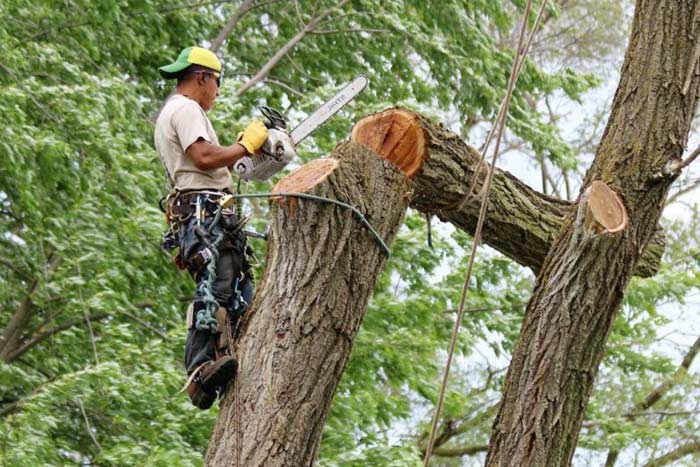Every City, County, and State has laws regarding the removal of trees on private property. These laws vary depending on the local climate, canopy cover of the trees, and various other factors.
The penalty for cutting down trees without a permit ranges from $500 – $10,000. There have been cases where the court has ruled fines much larger ranging right up to $100,000 per offense.
So you don’t get caught out for illegally removing a tree on your property, we have a look at what is legal, what is not, and where to get more information.

What we cover
ToggleAverage penalty
| Range | Amount |
|---|---|
| Low penalty | $1,000 |
| High penalty | $100,000 |
| National average | $10,000 |
Laws against cutting down trees
A Tree Ordinance is a set of laws outlined by your city related to tree removal and pruning. In most cases, it will define trees they deem as significant or heritage and others that are local pests.
Basically, as long as your tree is not large enough to be deemed as significant or old enough to be deemed as heritage, then you should be safe to remove the tree.
Example:
- Any tree in an example county cannot be trimmed, removed, vandalized, or destroyed in any way if it:
- Has a single trunk circumference of 20 inches or greater when measured at 3 feet from the ground, or;
- Has a combined trunk diameter of 20 inches or greater when measured at 3 feet above ground level, or;
- Is a protected species such as an Oak tree.
- Any of the following trees can be removed without permission no matter the size or age;
- Eucalyptus spp.
- Chinese tallow
- Honey Suckle
Note: The above is just an example of what you might find in your local tree ordinance. To download your local tree ordinance, go here to search for your state and city.
Maximum fines for illegal tree removal
This is something that also varies from state to state, but on average the maximum fine for illegal tree removal is $10,000 per offense. You can multiply that number by 10 if you live in some California cities. In 2016 Rudolph Koppl was fined $212,500 for removing trees from his property without a permit in Woodside, CA.
Do I need a permit to remove a tree?
If your tree is protected by law under your local tree ordinance, you will need a permit to remove it. These laws generally do not apply to trees that are clearly dead, dangerous as identified by a qualified arborist or have already fallen in a storm.
What happens when you cut down a tree without a permit?
A lot of the time, homeowners who cut down trees without a permit will not get caught. But if your neighbor sees you and calls the local council, they will come out the investigate. If you do not have a good reason for the removal of the tree i.e. the tree was dangerous or dead, then they will issue you with a date to appear in court or give you a fine on the spot.
What trees can be cut down without a permit?
There are lots of trees that can be cut down without a permit. Generally, these trees are not native to the area and are considered local pests. Again, this needs to be outlined in the local tree ordinance.
Take a palm tree for example. These trees are iconic in Florida, Nevada, and parts of California, but have no place in the pine forests or Colorado.
You can find what trees can be removed without a permit under the Exempt Trees list in your local tree ordinance.
Will I be fined for cutting down a dead tree?
In 99% of cases no. I know there are a few tree ordinances that forbid any tree removal, even dead trees until the city gives permission, but most of the time it is considered a hazard and should be removed at your soonest convenience.
Will insurance cover a penalty for illegal tree removal?
In short no. Insurance will cover a car accident, but not a speeding ticket. This is the same for illegal tree removal. If a neighbor’s tree falls on your home during a storm, insurance will cover you, but they will not come to the party if you break the law.




